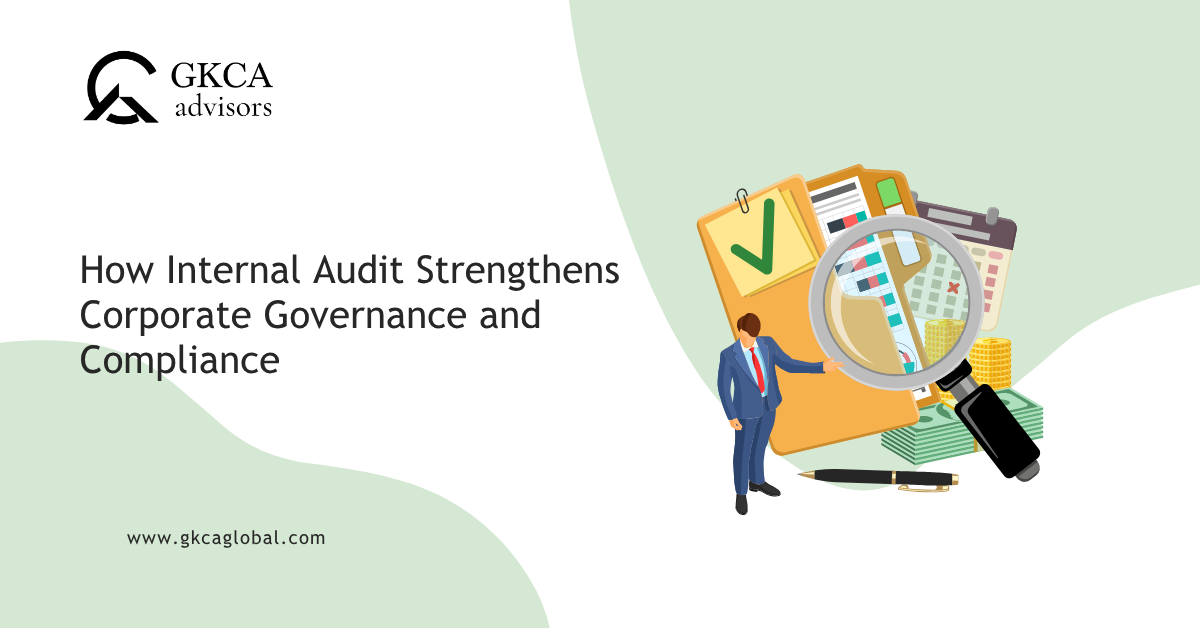Internal audit plays a vital role in strengthening corporate governance by providing independent assurance on risk management, internal control, and compliance processes. As an objective evaluator, internal audit helps organisations navigate complex business environments, enhance governance frameworks, and ensure compliance with corporate laws. This article is worth reading because it reveals how internal audit fosters operational efficiencies, mitigates risks, and promotes long-term success through effective governance.

Outline
1. Understanding Internal Audit and Corporate Governance
2. The Role of Internal Audit in Strengthening Governance
3. Internal Controls and Their Evaluation by Internal Audit
4. Risk Management: A Key Focus of Internal Audit
5. Internal Audit’s Contribution to Compliance Oversight
6. Enhancing Operational Efficiencies Through Internal Audit
7. The Role of the Internal Auditor and Audit Committee
8. Best Practices for an Effective Internal Audit Function
9. Governance Frameworks Supported by Internal Audit
10. Future Trends in Internal Auditing and Governance
Understanding Internal Audit and Corporate Governance
Internal audit is an independent and objective assurance function designed to add value and improve an organisation’s operations. It systematically evaluates the effectiveness of governance, risk management, and internal control processes. Corporate governance encompasses rules, practices, and structures that guide how a company achieves its objectives with accountability and transparency.
Strong corporate governance is now a strategic imperative, and internal audit serves as a cornerstone of effective governance. It supports the board of directors and senior management by assessing governance structures and processes within an organisation’s governance framework. Internal audit helps organisations maintain compliance with corporate laws and promotes ethical practices that uphold the organisation’s reputation and stakeholder trust.
By providing unbiased insights, internal audit fosters a culture of accountability and continuous improvement. It empowers boards and management with the necessary information to strengthen governance structures and ensure good governance aligned with regulatory requirements.
The Role of Internal Audit in Strengthening Governance
The role of internal audit is to provide assurance on the robustness of governance structures and internal controls. Internal audits evaluate adherence to governance frameworks and governance processes, allowing organisations to identify gaps and areas for improvement. Internal audit enhances corporate governance by promoting transparency, ethical behaviour, and accountability.
An effective internal audit function plays a vital role in risk assessment, regulatory compliance, and operational oversight. Internal auditors scrutinise the organisation’s risk management and internal control frameworks, ensuring they are aligned with governance best practices. By doing so, internal audit strengthens governance, equipping organisations to manage uncertainty and evolving risk landscapes proactively.
Internal audit also acts as a catalyst for positive change by offering actionable recommendations based on audit findings. This ongoing engagement helps governance structures evolve continually to meet the organisation’s strategic objectives and business environment demands.
Internal Controls and Their Evaluation by Internal Audit
Internal controls are policies and procedures designed to safeguard assets, ensure accurate financial reporting, and promote regulatory compliance. A key responsibility of the internal audit is to evaluate the design and operational effectiveness of internal controls. This evaluation protects the organisation from fraud, errors, and inefficiencies.
Internal auditors assess internal control systems across financial, operational, and compliance domains to ensure they function effectively. The effectiveness of internal controls directly influences the organisation’s ability to meet governance and compliance requirements. When control weaknesses are identified, internal audit provides recommendations to strengthen the control environment.
Strengthening internal controls through regular internal audits contributes to the robustness of corporate governance. It also mitigates compliance risks and enhances the organisation’s resilience against operational failures.
Risk Management: A Key Focus of Internal Audit
An essential function of internal audit is to support risk management by identifying, assessing, and prioritising risks that could impact organisational objectives. Risk management and internal controls are interrelated components within governance frameworks that internal audit scrutinises.
Internal audit enables organisations to adopt risk-based auditing approaches that focus resources on critical threats. This approach ensures that mitigation strategies are effective in reducing exposure to risks such as fraud, cybersecurity threats, and regulatory non-compliance. The organisation’s risk management practices are thus strengthened by the assurance provided by internal audit.
By facilitating comprehensive risk assessments, internal audit empowers management and the board to make informed strategic decisions. This proactive approach to risk management enhances the organisation’s ability to navigate complex business environments securely.
Internal Audit’s Contribution to Compliance Oversight
Compliance with corporate laws, regulations, and internal policies is a fundamental aspect of governance. Internal audit functions oversee regulatory compliance by monitoring adherence to compliance requirements, identifying compliance risks, and ensuring timely remedial actions.
Internal audit verifies the organisation’s compliance with policies and legal requirements through detailed audit plans and compliance reviews. This oversight role protects organisations from legal penalties, reputational damage, and operational disruptions resulting from non-compliance.
As regulatory environments evolve, internal audit’s role in compliance becomes increasingly critical. It provides assurance that governance structures incorporate compliance best practices, thereby enhancing the effectiveness of governance and fostering stakeholder confidence.
Enhancing Operational Efficiencies Through Internal Audit
Beyond governance and compliance, internal audit contributes to operational efficiencies by reviewing business processes and identifying inefficiencies or redundancies. Operational efficiencies are crucial for maintaining competitiveness and long-term success.
Internal auditors evaluate the effectiveness of operational controls and provide insights that optimise processes. Their audit findings highlight areas where operational practices can be improved to reduce costs, enhance productivity, and ensure resource allocation aligns with strategic priorities.
Internal audit plays a vital role in strengthening governance by ensuring that operational processes support corporate objectives. This holistic view of governance and operational efficiency aligns the organisation’s activities with its mission and values.
The Role of the Internal Auditor and Audit Committee
Internal auditors are professionals equipped with specialised skills to assess governance, compliance, and controls objectively. They function independently within the organisation, maintaining impartiality and credibility in their assessments.
The internal audit function works closely with the audit committee and board of directors to ensure governance objectives are met. The audit committee oversees internal audit activities, approves audit plans, and reviews audit findings to foster accountability.
Strong relationships between internal auditors, audit committees, and boards support effective governance frameworks. This collaboration ensures governance structures remain robust and responsive to emerging risks and regulatory changes.
Best Practices for an Effective Internal Audit Function
Effectiveness in internal auditing is achieved through adherence to professional standards, alignment with organisational strategy, and continual development of audit capabilities. Best practices include risk-based auditing, frequent communication with stakeholders, and employing technology such as data analytics.
An effective internal audit function adapts audit plans based on risk assessments, focusing on areas of highest impact. It also follows up on audit recommendations to ensure timely corrective actions and continuous improvement.
Investing in the internal audit team’s skills and resources enhances the organisation’s ability to manage risks, ensure compliance, and strengthen overall governance practices.
Governance Frameworks Supported by Internal Audit
Governance frameworks establish the policies, procedures, and structures that guide organisational behaviour. Internal audit evaluates the design and effectiveness of these governance structures, including board composition, committee roles, and communication channels.
By providing independent evaluations, internal audit supports the development of robust governance structures that facilitate transparency, accountability, and ethical conduct. This oversight enables organisations to meet their strategic and compliance objectives effectively.
Effective governance frameworks supported by internal audit are critical for adapting to the evolving regulatory landscape and operational challenges.
Future Trends in Internal Auditing and Governance
Emerging trends such as AI-powered audit tools, continuous monitoring, and increased focus on ESG (Environmental, Social, and Governance) factors are shaping the future of internal audit. These innovations enhance internal audit’s ability to provide real-time assurance and predictive insights.
Internal auditors are increasingly expected to address complex risks arising from digital disruption, cybersecurity, and geopolitical instability. The evolution of internal audit practices will continue to strengthen governance by equipping organisations to face future challenges proactively.
Embracing these trends ensures that internal audit remains an indispensable part of an organisation’s governance and compliance framework, driving sustainable success.
Key Takeaways
- Internal audit provides independent assurance on governance, risk management, and internal controls.
- It plays a vital role in strengthening corporate governance through transparency, accountability, and ethical oversight.
- Internal controls evaluation by internal audit mitigates fraud, errors, and inefficiencies.
- Risk management practices are strengthened by risk-based internal audits and mitigation strategies.
- Internal audit supports compliance oversight, reducing regulatory risks and legal penalties.
- Operational efficiencies are enhanced through audit-driven process improvements.
- Collaboration between internal auditors, audit committees, and boards promotes robust governance frameworks.
- Following best practices ensures an effective internal audit function aligned with organisational goals.
- Internal audit evaluates governance frameworks, supporting transparency and ethical conduct.
- Future trends like AI and continuous monitoring will transform internal audit’s role in governance.
